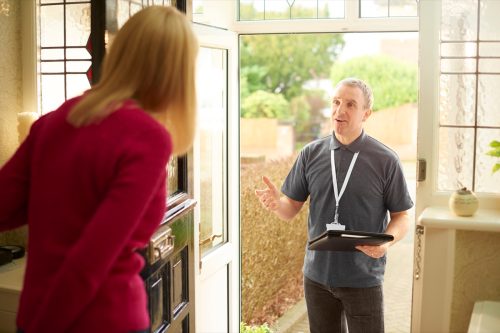The IRS Warns Not Doing This Could Cost You Big in New Alert to Taxpayers
The agency is alerting filers to this major potential problem.

Some taxpayers put off filing their tax returns until the last minute to avoid finding out if they owe the Internal Revenue Service (IRS) even more money. While a majority of taxpayers usually end up with a refund from the agency, others have to pay more taxes on the income they've made—and that's always a bitter pill to swallow. But waiting to file doesn't mean you shouldn't already be going through your personal information. The IRS is now warning that if you forget to do one thing, it could cost you far more than what you might otherwise end up owing them. Read on to learn what you need to make a priority.
RELATED: The IRS Warns You Could Get Fined for Forgetting This on Your Taxes.
The IRS is warning taxpayers to properly protect their personal information.

On March 16, the IRS posted a new alert, warning taxpayers to "stay resolute against ongoing scams and schemes" and protect their personal information online by properly securing their computers, tablets, and phones. If you don't take steps to keep your data away from other people, you could put yourself at risk for one dangerous consequence: identify theft.
"Solid cybersecurity protection and scam recognition is vital to reduce the threat of identity theft inside and outside the tax system," the agency explained. According to the IRS, there has been an 80 percent decline in tax identity theft from 2015 to 2019—but it's still a real risk. The agency stopped 443,000 confirmed fraudulent returns in 2019 and had 137,000 taxpayers file forms marking them as victims of tax identify theft that year, per Experian.
The agency has several tips for how to minimize your exposure to fraud and identity theft.

According to the IRS, taxpayers can take a number of actions to help protect their information and prevent identify theft, which includes minimizing their cybersecurity footprints. For basic personal data protection, the agency advises that you only provide this when necessary and on sites that have been verified as reputable and encrypted. "Social Security numbers, credit card numbers, bank and even utility account numbers can be used to help steal a person's money or open new accounts," the IRS said.
You should also be protecting your passwords by using a phrase or series of words that is easy for you to remember but has at least 10 characters that are a mix of letters, numbers, and special characters. The IRS said you should set password and encryption protections for wireless networks and use a virtual private network when connecting to public Wi-Fi as well.
Lastly, protect your computers, tablets, and phones at a basic level. "Use security software. An anti-virus program should provide protection from viruses, Trojans, spyware and adware," the IRS recommended, warning that you should also keep this software up-to-date and back up your files too. "No system is completely secure. Copy important files, including federal and state tax returns, onto removable discs or back-up drives and cloud storage. Store discs, drives and any paper copies in secure, locked locations," the agency added.
RELATED: For more financial advice delivered straight to your inbox, sign up for our daily newsletter.
The IRS does not contact taxpayers in certain ways.

According to the IRS, recognizing common scams can also protect you against identify theft. One of the clearest signs of trouble is getting contacted in certain ways by someone claiming to be with the IRS. The agency said it does not "initiate contact with taxpayers by email, text messages or social media channels to request personal or financial information."
Instead, the IRS said it will generally mail a paper bill to a person who owes taxes, as well as mail other notices and letters as need be. "The IRS initiates most contacts through regular mail delivered by the United States Postal Service," the agency said. Only in special situations will someone from the agency call you or come to your home or place of business to reach you.
These circumstances may include "when a taxpayer has an overdue tax bill, to secure a delinquent tax return or a delinquent employment tax payment, or to tour a business as part of an audit or during criminal investigations." The IRS said that even in these cases, taxpayers will generally receive several letters or notices from the agency in the mail first.
There are many ways to determine if you are dealing with an actual IRS official.

The IRS said an official could call or show up to your home or business unannounced under two circumstances: to collect a tax debt or while conducting a criminal investigation. For audits, the agency must first attempt to notify you by mail before calling. If you're being asked to make a payment to the IRS, you should also pay attention to how you're being asked to pay.
"The IRS does not call to demand immediate payment using a specific payment method such as a prepaid debit card, gift card or wire transfer [or] demand that you pay taxes without the opportunity to question or appeal the amount they say you owe," the agency said, adding that if you do make a payment, you will be instructed to make payments to the "United States Treasury" and no one else, not even a private collection agency.
Officials are also required to have information on them that verifies they work with the tax agency. "If an IRS representative visits you, he or she will always provide two forms of official credentials called a pocket commission and a HSPD-12 card. HSPD-12 is a government-wide standard for secure and reliable forms of identification for federal employees and contractors," the IRS explained.
If you're not automatically shown this information, you can also request to see it. "You have the right to see these credentials. And if you would like to verify information on the representative's HSPD-12 card, the representative will provide you with a dedicated IRS telephone number for verifying the information and confirming their identity," the agency added.
RELATED: Taking These 2 Deductions Could Get You Audited by the IRS, Experts Warn.





















